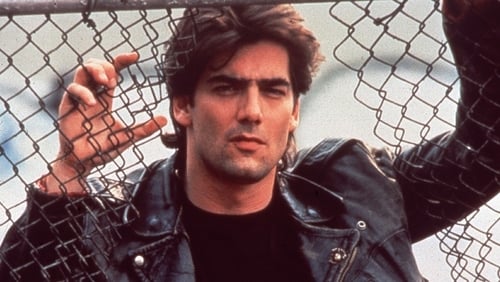Wiseguy (1987-1990) was one of the earliest prime time shows to experiment with real long-form, arc-based storytelling. Using strategies adapted from soap operas, producer Stephen J. Cannell (veteran of such consistent hits as The A-Team, The Rockford Files, 21 Jump Street) constructed its seasons not in terms of episodes but in terms of storylines. Almost thirty years later, some of the growing pains show, but Wiseguy remains entertaining fare; it doesn’t have the chalk-dust whiff of something now consumed only for educational value.
In fact, some of its casting has aged like fine wine. In these post-Breaking Bad days, it’s a thrill to see a younger but still unbelievably world-weary Jonathan Banks, here playing FBI agent Frank McPike, a sour Eeyore of an idealist; Kevin Spacey covers the back half of the first season as a neurotic, manic-depressive billionaire arms dealer in an incestuous relationship with his sister, a role he plays magnificently, exhaustively broadly in his eagerness to make his mark. Main series stars Ken Wahl, as undercover agent Vinnie Terranova, and Jim Byrnes, as his contact/support center “Lifeguard,” also do fine work, if they haven’t gone on to be names; Byrnes brings an almost effortless warmth and charisma, while Wahl offers a dogged soulfulness even while he perpetually flirts with a unibrow. Other first season highlights include Ray Sharkey as Atlantic City operative Sonny Steelgrave, the man Vinnie is most reluctant to take down (to the point where one of the major scenes of his “betrayal” gives the show is scored not only beautifully but suggestively); Joan Severance as a dangerously fragile, dangerously connected mark-once-removed; William Russ as a wry and hyper-competent hired killer with a private agenda; and Elsa Raven as Vinnie’s mother, earthy and warm and crucially smarter than her sons initially think.
The characters may have suddenly-intruding loves of their life, and they may find corpses in their backseats and then forget about it by the next episode–such are the trials and tribulations of being stuck halfway between episodic and serialized TV–but everything mostly holds together here. When the arcs hit speed bumps, the show still has some of the strengths of its episodic roots, and can still deliver consistent characterization with iconic, firmly outlined characters in high-pressure situations. Even if those situations are sometimes Gothically bizarre, like, say, convincing a delusional crime lord that you’re using a bust of Malthus to smash a crystal that contains his soul, or having a knockdown, drag-out fight in an abandoned movie theater before cooling down in front of the jukebox while jamming some air guitar on a broken mop.
The show takes a little time getting on its feet, but by episode five or six, everything is running smoothly. You can see the Second Golden Age of Television just starting to limber up here, and the results were–and remain–pretty damn good.
Wiseguy is available free (with ads) on Amazon Prime, Tubi, and Vudu.

